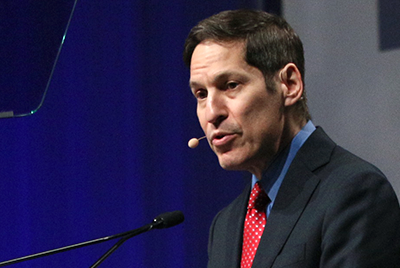Frieden Calls for Joining Psychiatry, Public Health During Convocation Lecture

“With a reciprocal revolution bringing together psychiatry and public health, we can affect deep societal change,” said Thomas Frieden, M.D., M.P.H., director of the Centers for Disease Control and Prevention, as he presented the William C. Menninger Memorial Convocation Lecture last night at APA’s Annual Meeting.
Frieden told psychiatrists at the Convocation that depression and severe mental illness, alcoholism, opioid addiction, suicide, HIV/AIDS, and a host of other conditions are amenable to solutions that look at broad societal influences, as well as the factors that influence individual behavior.
He was preceded at the podium by former First Lady Rosalynn Carter, who was a pioneering advocate for mental health and addiction treatment during her days in the White House. Carter described the work of the Carter Center, in Atlanta, to decrease stigma and increase access to quality mental health care.
Frieden was appointed CDC director by President Barack Obama in 2009. Since that time, he has led the agency’s response to the Ebola epidemic and other health emergencies, including the opioid addiction epidemic. Under his direction, new CDC programs have focused on combating antibiotic resistance, preventing foodborne and health care-associated infections, helping people quit smoking, and addressing the prescription drug epidemic.
Prior to coming to the CDC, he was New York City’s health commissioner. In that role, he led the city’s efforts against multidrug-resistant tuberculosis and reduced its incidence by 90 percent. Frieden said many of the same strategies that proved to be effective against TB can be effective against mental illnesses.
Much work needs to be done, and he cited the pervasiveness of criminalizing people with mental illness as an indicator of how far there is to go. “It is simply unacceptable that prisons and jails are the largest institutions caring for the mentally ill in America,” Frieden said.
But he closed with a hopeful vision in which every child in America grows into adulthood without ever having experienced addiction and without health challenges that inhibit achieving full potential. “Broad and deep change is possible at the individual and societal levels when psychiatry and public health join in a reciprocal revolution.”
(Image: David Hathcox)
|
|
|
|
|


